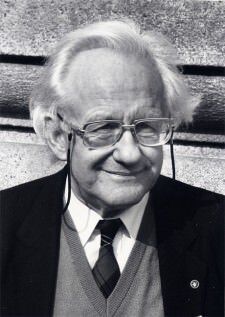By The Desmund Tutu Peace Foundation
Johan Galtung is a Norwegian professor and author, widely regarded as the “Father of Academic Peace Research.” He is a mathematician, sociologist, political scientist and the founder of the discipline of peace studies. His pioneering and continuing efforts have inspired the creation of Peace and Conflict Resolution academic programs in universities throughout the world.
Galtung was born in Oslo in 1930. He experienced World War II in German-occupied Norway, and as a 12 year old saw his father arrested by the Nazis. By 1951 he was already a committed peace mediator, and elected to do 18 months of social service in place of his obligatory military service. After 12 months, Galtung insisted that the remainder of his social service be spent in activities relevant to peace, to which the Norwegian authorities responded by sending him to prison, where he served six months.
During his 40 year career, Johan Galtung has been a visiting professor at 30 schools on 5 different continents. He has written more than 100 books and over 1,000 articles about peace and conflict resolution, ecology, health, global governance, sustainable development and economic reform. In 1959 he stated the International Peace Research Institute in Oslo and directed it for 10 years. In 1964, he launched the Journal for Peace Research at the University of Oslo. In 1993 he co-founded TRANSCEND – A Peace and Development Network for Conflict Transformation by Peaceful Means which has members in more than 50 countries.
Galtung first conceptualized “peacebuilding” by calling for systems that would create sustainable peace. He envisioned peacebuilding structures that would address the root causes of conflict and support local capacity for peace management and conflict resolution.
He is one of the authors of an influential account of news values which are the factors which determine what coverage is given to what stories in the news. Galtung originated the concept of Peace Journalism, which is increasingly influential in communications and media studies.
Galtung is also strongly associated with the following concepts:
Structural violence – Widely defined as the systematic ways in which a regime prevents individuals from achieving their full potential. Institutionalized racism and sexism are examples of this.
Negative vs. Positive Peace – The concept that peace may be more than just the absence of overt violent conflict (negative peace), and will likely include a range of relationships up to a state where nations (or any groupings in conflict) might have collaborative and supportive relationships (positive peace).
Galtung’s opinions and predictions have sometimes made him a controversial figure, but his lifelong contributions to the field of peace studies and conflict resolution have earned him a lasting place among the key figures in the global peace movement.
source: http://www.tutufoundationusa.org/2013/11/the-father-of-peace-research/

